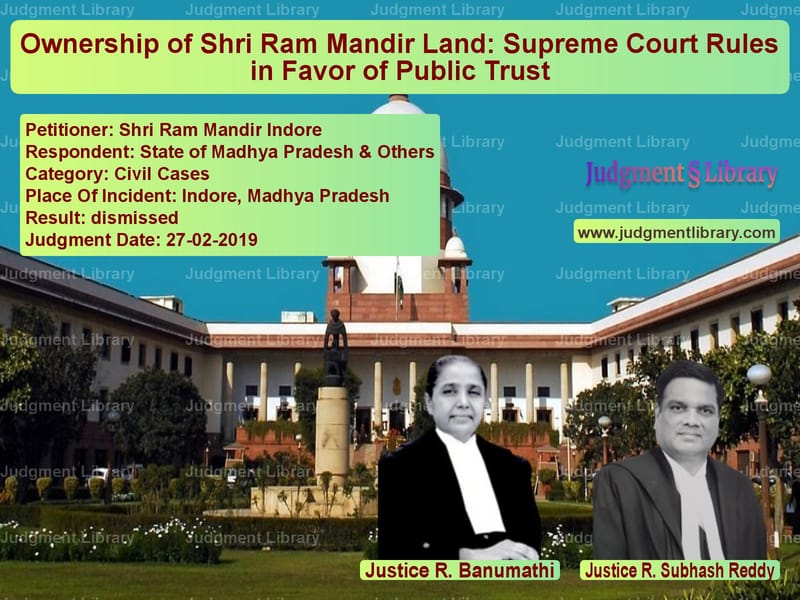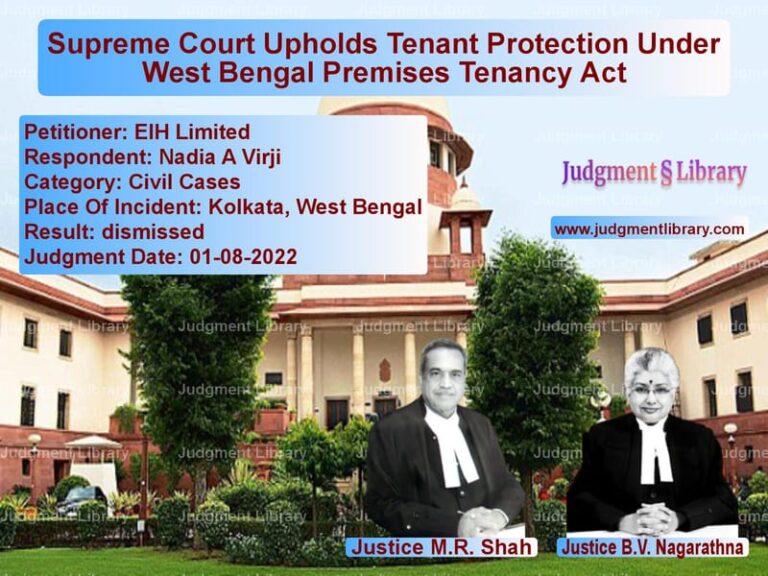Ownership of Shri Ram Mandir Land: Supreme Court Rules in Favor of Public Trust
The case of Shri Ram Mandir Indore vs. State of Madhya Pradesh & Others is a crucial legal battle concerning the ownership and management of temple lands. The Supreme Court was tasked with determining whether the Shri Ram Mandir in Indore was a private temple managed by hereditary pujaris or a public temple governed by the state. The dispute revolved around the status of the temple’s land and whether the government could exercise control over it.
Background of the Case
Shri Ram Mandir in Indore has been a place of worship for many years. The appellant claimed that the temple was a private institution managed by successive Mahants in a Guru-Shishya tradition. The dispute arose when the government recorded the temple as a public institution and listed the District Collector as its manager.
The appellant challenged this administrative decision, arguing that the temple was private and its land was not subject to government control. The state, however, contended that the temple was public, and its lands were granted in the name of the deity, not the pujaris. Consequently, the revenue department had the right to oversee its management and lease out its lands for temple upkeep.
Legal Battle in Lower Courts
The appellant filed a suit seeking a declaration that:
- Shri Ram Mandir was a private temple.
- The government had no authority to interfere in its management.
- The leasing of temple lands by the state was unlawful.
The trial court ruled in favor of the appellant, declaring the temple to be private and restraining the government from interfering in its affairs. However, the High Court reversed this decision, holding that the temple was public and subject to state control. The case then reached the Supreme Court.
Petitioner’s Arguments
The appellant, representing Shri Ram Mandir, argued:
- The temple was established by the predecessors of the Mahant and managed through a lineage system.
- The land was granted to the temple for its maintenance, not to the government.
- The government had no role in temple management, and its actions violated the rights of the Mahant.
- The entry of the District Collector as the temple manager in revenue records was illegal and done without notice.
- Past instances of leasing temple lands to private individuals did not indicate government ownership but were instead a financial arrangement for temple upkeep.
Respondent’s Arguments
The State of Madhya Pradesh and other respondents countered:
- Shri Ram Mandir was a public temple, not a private one.
- The temple land was recorded in the name of the deity, not any individual.
- Revenue records consistently showed the government as the temple manager.
- The Mahant was merely a pujari and had no legal ownership over the temple land.
- The temple was recognized as public property, and its lands were managed for the benefit of worshippers, not individual pujaris.
Supreme Court’s Observations
The Supreme Court examined the historical records and legal framework governing temple ownership. The Court noted:
“The onus of proving that Shri Ram Mandir is a private temple lies on the appellant, who claims exclusive rights over its management. In the absence of clear evidence establishing hereditary ownership, the presumption of a public temple stands.”
The Court referred to previous cases where temples were deemed public if they served a broad community rather than a closed lineage. The judgment emphasized:
“The participation of the public in temple worship, the absence of a hereditary managerial system, and the inclusion of the temple in official records as public property all indicate that Shri Ram Mandir is a public institution.”
Analysis of Temple Lands
The Supreme Court analyzed the nature of the land grants made to the temple. It found that:
- The land was given in the name of the deity, not the Mahant.
- Revenue records consistently listed the Collector as the manager.
- There was no registered lease or sale deed transferring ownership to any private party.
- The state had periodically leased out temple lands for maintenance, further reinforcing its role in administration.
Final Judgment
After considering all arguments, the Supreme Court ruled:
- Shri Ram Mandir is a public temple, not a private one.
- The land is owned by the deity, and its management falls under state jurisdiction.
- The Collector’s role as manager is legally valid.
- The appellant has no right to claim ownership over temple lands.
- The High Court’s ruling is upheld, and the appeal is dismissed.
Conclusion
This landmark judgment affirms the principle that places of worship serving the public cannot be claimed as private properties by individuals managing them. The ruling sets a precedent for temple management disputes, ensuring that temples remain accessible to devotees and are managed in the public interest. By upholding the state’s authority in overseeing temple lands, the Supreme Court has reinforced legal safeguards against private claims over religious institutions.
Petitioner Name: Shri Ram Mandir Indore.Respondent Name: State of Madhya Pradesh & Others.Judgment By: Justice R. Banumathi, Justice R. Subhash Reddy.Place Of Incident: Indore, Madhya Pradesh.Judgment Date: 27-02-2019.
Don’t miss out on the full details! Download the complete judgment in PDF format below and gain valuable insights instantly!
Download Judgment: Shri Ram Mandir Indo vs State of Madhya Prad Supreme Court of India Judgment Dated 27-02-2019.pdf
Direct Downlaod Judgment: Direct downlaod this Judgment
See all petitions in Property Disputes
See all petitions in Succession and Wills
See all petitions in Judgment by R. Banumathi
See all petitions in Judgment by R. Subhash Reddy
See all petitions in dismissed
See all petitions in supreme court of India judgments February 2019
See all petitions in 2019 judgments
See all posts in Civil Cases Category
See all allowed petitions in Civil Cases Category
See all Dismissed petitions in Civil Cases Category
See all partially allowed petitions in Civil Cases Category







